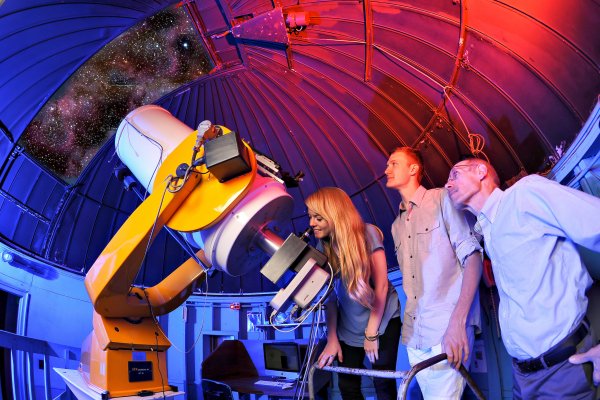32-hour B.S. in Astronomy
This flexible degree plan can accommodate a variety of interests, and electives can be selected to prepare students for several career paths. Students who pursue this degree adopt one of the following options:
- a stand-alone major in astronomy, achieved by completing at least eight additional credit hours in astronomy;
- a second major in a non-science discipline;
- the 32-credit complementary major in environmental science;
- a disciplinary science minor (qualifying disciplines include biology, chemistry, computer science, engineering, geography, geology, mathematics, meteorology, physics, and psychology); OR
- a minor in fundamentals of business, business administration, applied statistics, engineering, or geographic information systems.
In addition to completing the required courses, students are encouraged to take advantage of any of the many research opportunities available at Valpo.
Foundations
B.S. students in astronomy at Valpo must complete the general-education requirements for the B.S. This University-wide core strengthens communication and critical-thinking skills while introducing the student to global cultures and traditions. General-education requirements for the B.S. (.pdf) »
Requirements for the Major
The following courses constitute the minimum 32 credits required for the major. Further courses are recommended for students who are interested in graduate study in astronomy.
It is assumed that students will acquire competency in at least one computer programming language (FORTRAN, C, C++).
| Core Courses | 32 credits | ||
| ASTR 101 | Astronomy | 3 credits | |
| ASTR 101L | Astronomy Laboratory | 1 credit | |
| ASTR 221 | Observational Astronomy | 1 credit | |
| ASTR 252 | Introduction to Stellar Astrophysics | 3 credits | |
| ASTR 253 | Introduction to Galactic Astrophysics and Cosmology | 3 credits | |
| ASTR 445 | Senior Research in Astronomy | 2 credits | |
| PHYS 141 | Newtonian Mechanics | 3 credits | |
| PHYS 141L | Experimental Physics I | 1 credit | |
| PHYS 142 | Physics: Electricity, Magnetism, and Waves | 3 credits | |
| PHYS 142L | Experimental Physics II | 1 credit | |
| PHYS 243 | Physics: Atoms and Nuclei | 3 credits | |
| PHYS 245 | Experimental Physics III | 1 credit | |
| PHYS 246 | Data Reduction and Error Analysis | 1 credit | |
| PHYS 250 | Mechanics | 3 credits | |
| PHYS 360 | Thermal Physics | 3 credits | |
| PHYS 499 | Physics and Astronomy Colloquium | 0 credit | |
| TOTAL | 32 credits | ||
Courses recommended for students intending to pursue graduate study in astronomy or astrophysics:
| |||
Additional Recommended Courses:
|
